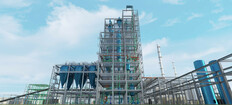- The AMA facility will produce around 87.5 KTA of renewable methanol.
- The plant will convert non-recyclable waste equivalent to that of 290,000 households yearly.
- The facility will be built in the BioPark at the Port of Amsterdam.
- GIDARA Energy acquired HTW® biomass gasification technology in 2019.

Facility Overview
GIDARA Energy is launching its first advanced biofuels facility, Advanced Methanol Amsterdam (AMA), in Amsterdam. The plant will convert non-recyclable waste into advanced methanol, which will be used for fuel blending to meet CO2 emission reduction targets as defined in the RED II and national legislations. This renewable fuel will replace fossil-based fuels, resulting in significant carbon savings.
Technology and Capacity
The AMA facility will utilize the HTW® technology, which has been technically and commercially proven for decades in industrial-scale facilities using biomass and waste as feedstock. GIDARA Energy acquired this technology in 2019 to convert non-recyclable waste into valuable end products. The facility aims for near-zero emissions by minimizing waste throughout the value chain and process integration. It will produce approximately 87.5 KTA of renewable methanol by converting waste equivalent to that of 290,000 households annually.
Location and Infrastructure
The AMA facility will be built in the BioPark, an industrial area in the Port of Amsterdam designed for renewable fuel producers. The state-of-the-art facility will include a knowledge center with a testing facility and pilot plant, as well as the commercial-scale plant using GIDARA Energy’s patented HTW® technology. The goal is to contribute to more sustainable fuels while maintaining a fully circular value chain. The facility will serve Amsterdam, the Netherlands, and the rest of Europe in the energy transition to meet sustainability objectives.
Strategic Importance
According to Roon van Maanen, Director of Energy & Circular Industry at the Port of Amsterdam, the AMA initiative bridges waste handling and the renewable fuel industry. It is a flagship project aimed at achieving sustainability objectives by promoting more sustainable fuel sources and maximizing recycling.

